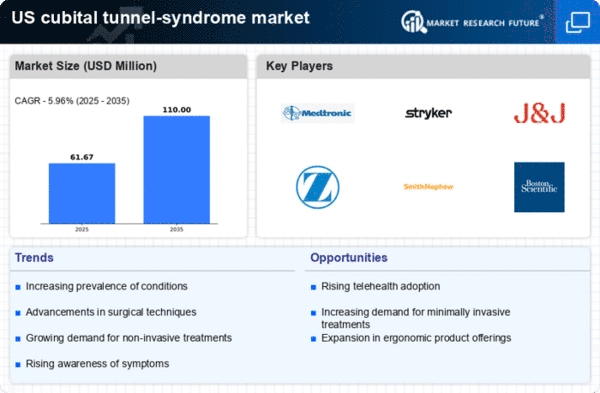Growing Geriatric Population
The aging population in the United States is a crucial driver for the cubital tunnel-syndrome market. As individuals age, the risk of developing musculoskeletal disorders, including cubital tunnel syndrome, tends to increase. The geriatric demographic is particularly susceptible to nerve compression syndromes due to age-related changes in connective tissues and overall health. By 2030, it is projected that approximately 20% of the U.S. population will be aged 65 and older, creating a larger patient base for healthcare providers. This demographic shift is likely to result in heightened demand for both surgical and non-surgical treatment options within the cubital tunnel-syndrome market. Consequently, healthcare systems must adapt to meet the needs of this growing population, further propelling market expansion.
Expansion of Rehabilitation Services
The cubital tunnel-syndrome market is poised for growth due to the expansion of rehabilitation services tailored to nerve compression syndromes. Rehabilitation programs focusing on physical therapy, occupational therapy, and pain management are becoming increasingly accessible. These services aim to improve functional outcomes for patients suffering from cubital tunnel syndrome. The integration of multidisciplinary approaches in rehabilitation is likely to enhance recovery rates and patient satisfaction. Furthermore, as healthcare providers recognize the importance of comprehensive care, the demand for specialized rehabilitation services is expected to increase. This trend reflects a broader shift towards holistic treatment strategies within the cubital tunnel-syndrome market, ultimately benefiting patients and healthcare systems alike.
Increased Focus on Occupational Health
The cubital tunnel-syndrome market is benefiting from a heightened focus on occupational health and safety. Many workplaces are recognizing the importance of ergonomics and preventive measures to reduce the incidence of work-related injuries, including cubital tunnel syndrome. Employers are increasingly investing in training programs and ergonomic assessments to mitigate risks associated with repetitive tasks. This proactive approach not only enhances employee well-being but also reduces healthcare costs associated with treatment. As organizations prioritize employee health, the demand for interventions and therapies related to cubital tunnel syndrome is expected to rise. This trend indicates a growing awareness of the condition and its impact on workforce productivity, thereby driving the cubital tunnel-syndrome market.
Rising Incidence of Cubital Tunnel Syndrome
The cubital tunnel-syndrome market is experiencing growth due to the increasing incidence of this condition among the population. Factors such as repetitive arm movements and prolonged elbow flexion contribute to the rising number of cases. According to recent data, the prevalence of cubital tunnel syndrome is estimated to be around 1-2% in the general population, with higher rates observed in specific occupational groups. This trend indicates a growing need for effective treatment options and management strategies within the cubital tunnel-syndrome market. As awareness of the condition increases, healthcare providers are more likely to diagnose and treat patients, further driving market growth. The demand for surgical interventions and conservative management options is expected to rise, reflecting the need for comprehensive care in the cubital tunnel-syndrome market.
Technological Advancements in Diagnostic Tools
The cubital tunnel-syndrome market is significantly influenced by advancements in diagnostic technologies. Innovations such as high-resolution ultrasound and electromyography have improved the accuracy of diagnosing cubital tunnel syndrome. These tools enable healthcare professionals to assess nerve compression more effectively, leading to timely interventions. The adoption of these technologies is likely to enhance patient outcomes and reduce the overall burden of the condition. Furthermore, as diagnostic capabilities improve, the number of diagnosed cases may increase, subsequently expanding the cubital tunnel-syndrome market. The integration of advanced imaging techniques into clinical practice is expected to facilitate better treatment planning and monitoring, thereby driving market growth.




















Leave a Comment